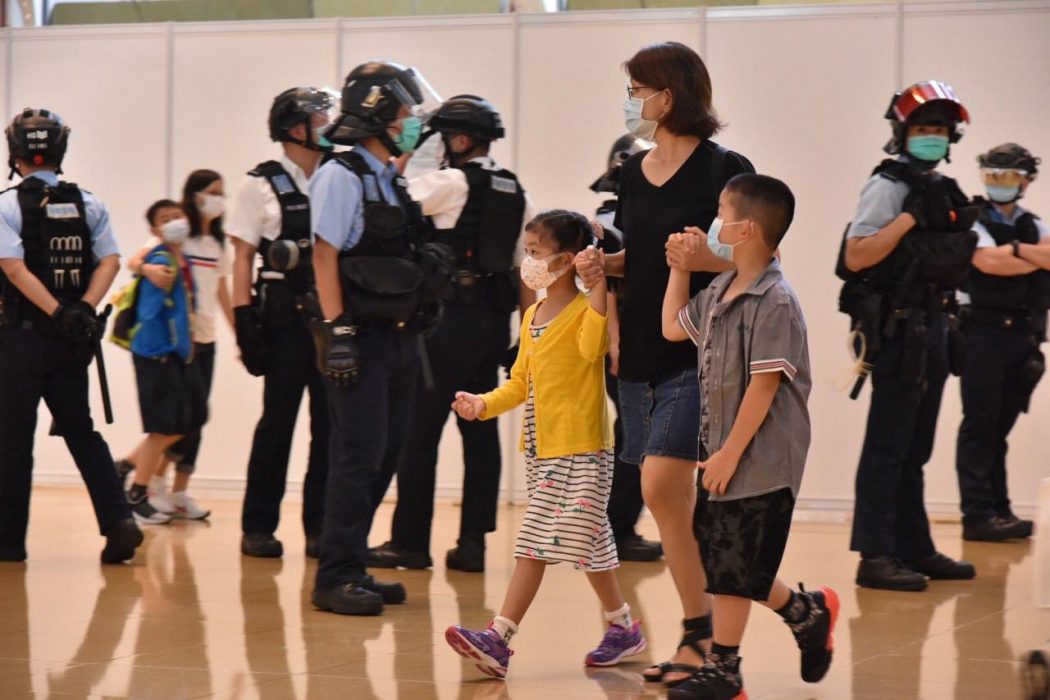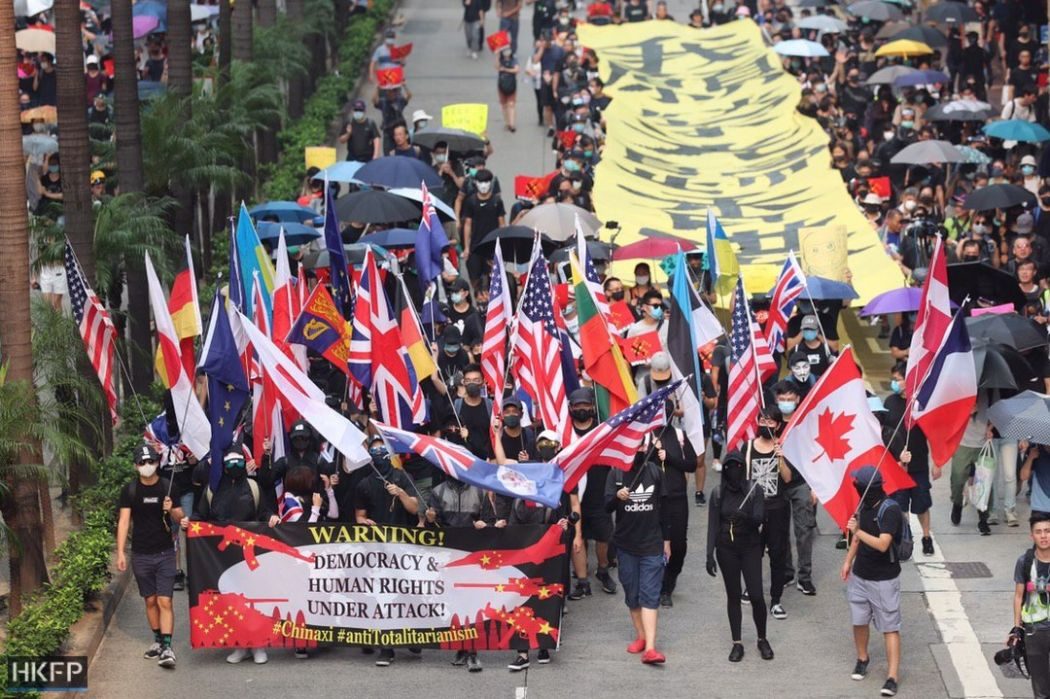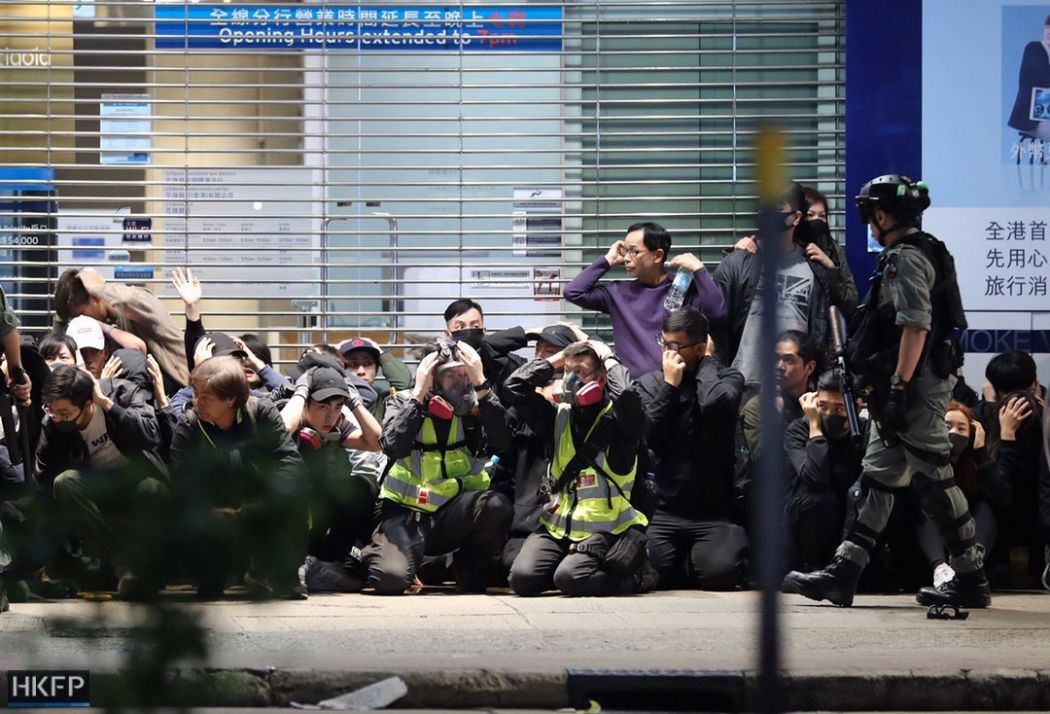While Mothers’ Day around the world is a time when families relax together and children give their mothers cards, gifts and acts of kindness, in Hong Kong this year Mothers’ Day was a day when mothers wept.
It was a day when the Hong Kong Police Force fired pepper balls at shoppers, threatened a woman with a baby in her arms, pinned a ten-year-old child to the ground, chased a 17-year-old first aider and arrested a 12 year-old boy called Luk who was courageously and enterprisingly pursuing his dream as a cub reporter.

It was a day when journalists were assaulted en masse, when passersby were insulted and threatened, a woman was sexually harassed and detainees forced by the police to kneel and crawl on the ground.
It was a day when an elected legislator, Roy Kwong Chun-yu, was attacked by the police after he intervened to mediate between them and protesters. Mr Kwong was hospitalised after police sat on him and kneeled on his head. It was a day when dozens of male police officers barged into the ladies’ toilets and hauled away a group of terrified, screaming women. It was a terrible day for Hong Kong.
Hong Kong has seen many dark days over the past year, and in recent weeks they have become darker still. Mother’s Day tears came just two days after chaotic scenes in the Legislative Council in which pro-Beijing legislators attempted to seize control of proceedings – not through constitutional means, but by thuggery and violence.
Pro-democracy legislators were threatened, attacked and dragged out from the chamber by force. Several were injured. At least one was carried out on a stretcher and hospitalised. And yet instead of condemning such unparliamentary conduct, the Hong Kong Government praised the pro-Beijing legislators.
And this has followed the arrests on 18 April of 15 of Hong Kong’s most distinguished, respected pro-democracy campaigners, including the man known as the “father” of the democracy movement, Martin Lee Chu-ming.

Last month the Chinese Communist Party regime called for the rapid implementation an anti-sedition national security law in Hong Kong, which would have a devastating impact on freedom of expression in the city, and this month Hong Kong’s Chief Executive Carrie Lam called for legislation criminalising perceived insults to China’s national anthem to be expedited.
Beijing has also made it clear that Article 22 of Hong Kong’s mini-constitution, the Basic Law, which prohibits mainland Chinese government departments from interfering in matters which are the responsibility of Hong Kong authorities under the “one country, two systems” principle upon which Hong Kong was handed to China 23 years ago, no longer applies.
That move alone is a direct assault at the “high degree of autonomy” promised to Hong Kong in the Sino-British Joint Declaration, and as such is also a breach of an international treaty lodged at the United Nations.

Taken together, these amount to the hammering of the final nails into the coffin of “one country, two systems”. The process of strangulation of Hong Kong’s freedoms by the regime in Beijing began some years ago, and has steadily accelerated in recent years, with the abduction into the mainland of five Hong Kong-based booksellers, the disqualification of pro-democracy candidates and legislators, the imprisonment of peaceful protesters, the expulsion of some foreign activists and journalists and, over the past year, escalating police brutality.
If the international community does not move rapidly – and robustly – Hong Kong itself will be killed. Hong Kong is an international financial hub that matters to the world, but its success depends on its way of life – the rule of law, an independent judiciary, a free press, transparency, accountability, freedom of expression, autonomy. One by one these characteristics that have made Hong Kong are being dismantled with alarming speed.
The rest of the world is, understandably, focused on the Covid-19 pandemic. Presumably that is why the Chinese Communist Party is moving fast, in the hope that its actions will go unnoticed. We must not let this happen. This cruel regime inflicted the pandemic on the rest of us as a result of its repression and mendacity. We cannot allow them to take advantage of the moment to destroy Hong Kong.
There are three steps that are urgently needed.

First, international co-ordination. Britain, as the signatory to the Joint Declaration, must lead, but it must bring allies together, because there is strength in numbers. An international contact group focused on Hong Kong should be formed, with the United States, Canada, Australia, New Zealand, the European Union and its member states as well as democracies in Asia such as Japan, South Korea, Taiwan and others, to speak with one voice.
Second, an international inquiry. The Hong Kong people have lost complete trust in the Hong Kong police after their conduct over the past year. The Hong Kong Government has made it clear that it will not allow an independent inquiry into police brutality, despite repeated calls, and so if that is the case, there should be an international investigation.
In recent weeks six United Nations special rapporteurs have published their concerns about the Hong Kong police force’s use of teargas and arrest and harassment of medical professionals and first-aiders. A group in Britain’s Parliament is conducting an inquiry. But there is a need for an international inquiry with the power to end impunity and hold the perpetrators of grave human rights violations to account.

And third – we need targeted Magnitsky-style sanctions, imposed on senior government officials and police officers directly responsible for, or complicit with, serious violations of human rights.
To Hong Kongers, I want to say this: I follow events in your city very closely every day, for three reasons. First, it was once my home too. I lived in Hong Kong for the first five years after the handover, for the first five years of my working life. And while I no longer live in Hong Kong, Hong Kong lives on in my heart. Second, as a British citizen I feel a particular responsibility, and I will do everything I can to get my government to live up to its responsibilities. And third, as a human rights activist I know Hong Kong is the frontline in the fight for freedom for all of us. Your fight is my fight.

To 13 year-old Luk, I say this: I began my career as a journalist in Hong Kong. Do not apologise for what you did. Be proud of it. You are a bright, brave young guy and you deserve the respect, applause and support of the world. My Dad once told me that what is important in life is to “follow your star”. Your experience on Sunday will understandably have frightened you. But don’t give up your hopes and dreams. I salute you.
And to the world, I say this: if we ignore the scenes of legislators dragged to the floor by police or pro-Beijing thugs, if we turn a blind eye to police attacks on children and sexual harassment of women, and if we are silent in the face of arrests of medics and journalists, then the Chinese Communist Party regime will not only have succeeded in strangling Hong Kong to death, it will have trampled on the international rules-based order with impunity – and that threatens us all. We cannot let that happen. I will not let that happen. I will do everything I can to urge the world to act now – and fast.

